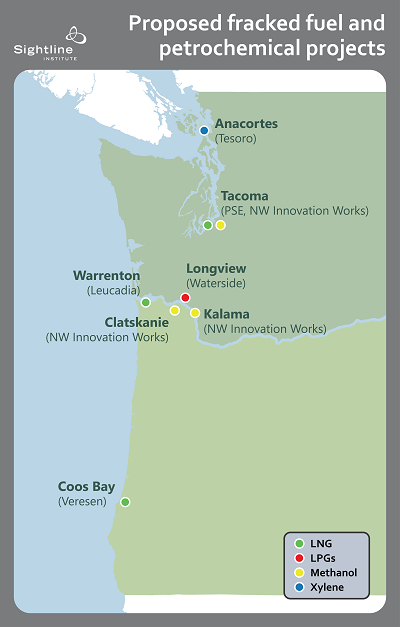For Immediate Release: February 18, 2016
Contact: Eric de Place, eric@sightline.org, 206-447-1880 x105

Original Sightline Institute graphic, available under our free use policy.
SEATTLE, WA—Eight proposals in Oregon and Washington would build new refineries, pipelines, and port facilities to export fracked fuels and petrochemicals in very large quantities. These projects are a previously unexamined third wave in Northwest fossil fuel infrastructure development plans, following on the heels of coal export and oil-by-rail proposals. A new report from Sightline Institute undertakes the first regionwide review of these projects, finding that together they could export 16.7 million metric tons of liquefied natural gas (LNG), 27.4 million barrels of propane-like gases, 14.5 million tons of methanol, and 5.5 million barrels of xylene each year.
The fracked fuel and petrochemical facilities analyzed in the report would dot Northwest shorelines from Coos Bay, Oregon, to Anacortes, Washington, and they would pose a range of challenges to communities throughout the region. The developments would consume huge quantities of fresh water from sources like the Columbia and other rivers, release numerous toxic contaminants into the Northwest’s air and water, and add to region’s carbon pollution load. These projects would receive their inputs from yet-to-be-built gas pipelines and mile-long “unit” trains, and they would export their products in oceangoing tankers and specialized gas-carrying vessels.
Notable among the projects is the proposed methanol plant at Tacoma, Washington, which would be the largest methanol refinery anywhere in the world.
“The Northwest is facing yet another round of threats from the oil and gas industry,” says report author and Sightline policy director Eric de Place. “Whether it’s coal and oil trains or now fracked gas and petrochemicals, these projects would turn our region into a major world depot for fossil fuel shipments. But as we’ve seen, the Northwest is also home to the thin green line, a serious opposition movement that has already a track record of fighting and defeating proposals like these.”
See the full report, “Fracked Fuel and Petrochemical Proposals in the Northwest,” at sightline.org/FrackedNW.
###
Sightline Institute is an independent think tank providing leading original analysis of energy, economic, and environmental policy in the Pacific Northwest.







